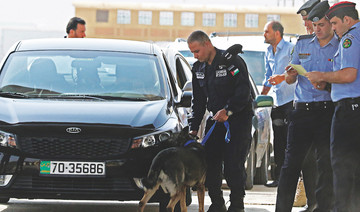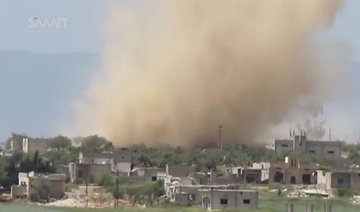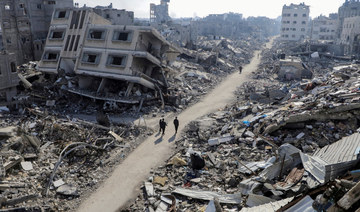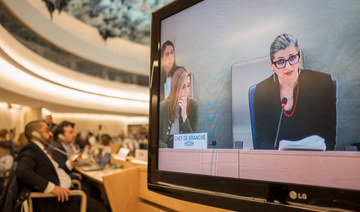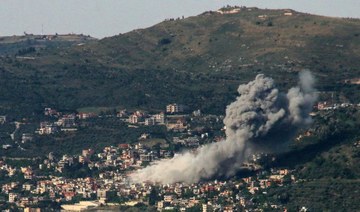NASSIB, Syria: Near the recently reopened border with Jordan, former Syrian rebel fighter Bahaa Al-Masri sells date-filled pastries and sesame biscuits to Jordanians flocking across the frontier to snap up bargains.
Syrian regime forces retook control of the Nassib border crossing from rebels in July, and last month reopened it after a three-year closure.
Just several hundred meters (yards) from the frontier, 26-year-old Masri counts the boxes of biscuits he still has left in a green plastic crate strapped to the back of his motorbike.
“For two weeks I have been bringing sweets from Damascus and selling them to Jordanians who come to buy them here because they’re cheaper,” says the ex-combatant, wearing a black jacket and woollen hat.
“I sell 27 to 30 boxes a day.”
Masri hawks the pastries every day in a rest area on the edge of Syria’s southern province of Daraa for three Jordanian dinars each (around $4, 3.5 euros).
“Thank God, when the border opened there was work again here, after I spent around six years without a job,” Masri tells AFP.
Because money was tight, he joined a rebel group that paid him a monthly wage to fight.
“I picked up arms so we could eat and live,” he says, crates of green apples and oranges stacked behind him.
Daraa was once seen as the cradle of Syria’s seven-year uprising, but in July regime forces took back control through a military push and deals that saw rebels surrender.
Under those agreements, brokered by regime ally Russia, many fighters chose to leave with their families to remaining opposition areas in northern Syria.
But Masri opted to stay and settled his status officially with the returning government authorities, a move likely to see him called up for military service.
Until the summons comes from the army, he is happy taking advantage of the money-making opportunities on offer now the border is open.
Also looking to cash in are Jordanian drivers, jokingly dubbed “sailors,” who ferry goods from Syria across the frontier for a small commission.
A whole economy has sprung up again since the border begun working.
At the crossing itself cars sit side by side in several long queues waiting to cross over into Syria.
Large trucks, some refrigerated, also wait their turn.
Before the war, “we used to come over to Syria every day — sometimes just to have breakfast,” says Mohammed Sayes, a 25-year-old from Jordan’s adjacent border town of Ramtha.
It was his second such trip since the border reopened “to see the sights, go out and eat” cheap, he says.
“Yes, Syria lived through a war, but we suffered a siege,” says the specialist in tourism management.
“When the border reopened, it was like paradise opened up again.”
Further up, dozens of people stand in line outside a row of small pre-fabricated buildings to have their Jordanian passports stamped by Syrian officials.
Jordanian driver Muflah Al-Hurani, 53, is crossing the border to drive a family back home from the Syrian capital Damascus just over 100 kilometers (60 miles) to the north.
He has been going in and out of Syria on an almost daily basis since Nassib reopened, to transport passengers or shop for relatives.
“I bring back fruit and vegetables including potatoes, onions, garlic, as well as children’s clothes made of cotton,” he says.
“And I fill up my car will fuel... It’s less than half the price (in Syria) despite the war.”
Not far off, the former arrivals hall is being repaired after it was damaged in the war.
Workers carry rubble away and a rebel slogan is still visible.
Damascus hopes the reopening of Nassib will boost its war-ravaged economy.
Before the conflict, the crossing was a key passage for trade, linking Syria — but also Lebanon and Turkey — with Jordan and the Gulf beyond.
Syrian officials have registered more than 33,000 arrivals since October 15, against 29,000 departures.
Among those waiting to head across the border are also Syrians returning home, car roofs piled high with suitcases and blankets.
Last week, a Jordanian official said 6,000 Syrians had gone back to their country, among them 517 registered refugees.
The head of the Nassib crossing Col. Mazen Ghandour says the number of people heading into Syria is increasing daily, and that most of those coming are Jordanians.
“Most Jordanians come to shop and then go home,” Ghandour says. “Others go to see Damascus.”
A few meters away, a Syrian woman living in Jordan smiles as she waits to cross over with her family for a two-week visit.
“Damascus is a blessing... That’s why everybody wants to visit after being cut off for so long,” she says.
At Syria border, Jordanians dash over for cheap shopping
At Syria border, Jordanians dash over for cheap shopping
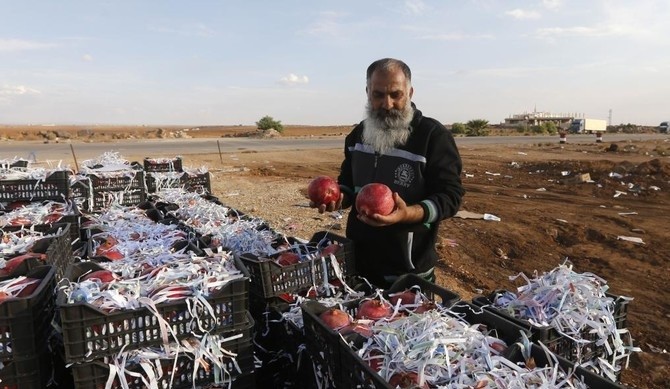
- Syrian regime forces retook control of the Nassib border crossing from rebels in July, and last month reopened it after a three-year closure
- Syrian officials have registered more than 33,000 arrivals since October 15, against 29,000 departures
UN says informed Israel of vehicle fatally hit in Gaza
- The employee killed was an Indian national, UN spokesman Rolando Gomez told a media briefing
- A second UN DSS staff member who was in the vehicle at the time was wounded in the attack
One UN security services member was killed and another wounded in the attack on Monday, the United Nations said, marking the first death of a UN international employee in the Palestinian territory since the war began more than seven months ago.
The employee killed was an Indian national, UN spokesman Rolando Gomez told a media briefing.
“We are deeply saddened by the loss of Col Waibhav Kale, working for the UN Department of Safety and Security in Gaza,” India’s mission to the UN in New York confirmed on X.
“Our deepest condolences are with the family during this difficult time.”
A second UN DSS staff member who was in the vehicle at the time was wounded in the attack, Gomez said, adding that the two had been traveling to the European Hospital in Rafah when their vehicle was hit.
“The UN informs Israeli authorities of the movement of all of our convoys. That has been the case in any theater of operation. This is a standard operating procedure,” said Gomez.
“This was the case yesterday (Monday) morning, so we have informed them. And it was a clearly marked UN vehicle.”
He added: “This is a sheer illustration that there’s really nowhere safe in Gaza at the moment.”
When asked about the attack, the Israeli military sent AFP a statement apparently drafted on Monday saying that the DSS had informed it of the hit.
“An initial inquiry conducted indicates that the vehicle was hit in an area declared an active combat zone,” the military said, maintaining that it had “not been made aware of the route of the vehicle.”
“The incident is under review,” it said, without attributing responsibility for the strike.
Gomez said UN Secretary-General Antonio Guterres had called for a full investigation.
“Of course we want accountability. This is the ultimate aim of this investigation. International humanitarian workers are not targets, so such attacks must end,” he said.
While Monday’s attack marked the first time a UN international employee has been killed in the Gaza war, a large number of local staff have been killed.
The UN agency for Palestinian refugees, UNRWA, alone has lost 188 of its 13,000 Gaza staff, according to UN figures.
“No one is safe in Gaza, including aid workers,” UNRWA chief Philippe Lazzarini said on X, formerly Twitter.
The bloodiest ever Gaza war broke out after Hamas’s October 7 attack on Israel, which resulted in the deaths of more than 1,170 people, mostly civilians, according to an AFP tally of Israeli official figures.
Israel’s retaliatory offensive against Hamas has killed at least 35,173 Palestinians in Gaza, mostly women and children, according to the Hamas-run territory’s health ministry.
Turkiye says to apply to intervene in ICJ genocide case against Israel

- Ankara steps up measures against Israel over its assault on Gaza, which has killed more than 35,000 people
ANKARA: Foreign Minister Hakan Fidan said on Tuesday that Turkiye decided to submit its declaration of official intervention in South Africa’s genocide case against Israel at the International Court of Justice (ICJ).
Earlier this month Fidan announced the decision to join the case launched by South Africa as Ankara steps up measures against Israel over its assault on Gaza, which has killed more than 35,000 people and launched after militant group Hamas’ Oct. 7 rampage.
“We condemned civilians being killed on October 7,” he told a press conference with his Austrian counterpart.
“But Israel systematically killing thousands of innocent Palestinians and rendering a whole residential area uninhabitable is a crime against humanity, attempted genocide, and the manifestation of genocide,” he added.
A foreign ministry official said Turkiye had not yet submitted the formal application to the ICJ.
The World Court will hold hearings on Thursday and Friday to discuss new emergency measures sought by South Africa over Israel’s attacks on Rafah during the war in Gaza, the tribunal said Monday.
The hearings on May 16 and 17 will deal with South Africa’s request to the court to order more emergency measures against Israel over its attacks on Rafah, the tribunal added, part of an ongoing case which accuses Israel of acts of genocide against Palestinians.
Israel has previously said it is acting in accordance with international law in Gaza, and has called South Africa’s genocide case baseless and accused Pretoria of acting as “the legal arm of Hamas.”
Lebanon resumes ‘voluntary’ repatriations of Syrians

- Vans and small trucks gathered in the Arsal area near the border early in the morning to ferry home the returnee
- Human rights group Amnesty International said at the time that Lebanese authorities were putting Syrians at risk of “heinous abuse and persecution upon their return,”
Beirut: Beirut repatriated several hundred Syrians on Tuesday in coordination with Damascus, an AFP photographer reported, as pressure mounts in cash-strapped Lebanon for the hundreds of thousands refugees to go home.
Vans and small trucks gathered in the Arsal area near the border early in the morning to ferry home the returnees, the photographer said.
The vehicles were piled high with mattresses and other belongings and some were even accompanied by livestock.
“I’m going back alone for the moment, in order to prepare for my family’s return,” said a 57-year-old man originally from Syria’s Qalamun area, declining to be identified by name.
“I am happy to go back to my country after 10 years” as a refugee, he told AFP.
Around 330 people had registered to be part of the “voluntary return,” Lebanon’s official National News Agency (NNA) said.
Syrian state news agency SANA reported an unspecified number of people arrived from Lebanon as part of the initiative.
Lebanon, which has been mired in a crushing economic crisis since late 2019, says it hosts around two million Syrians, the world’s highest number of refugees per capita, with almost 785,000 registered with the United Nations.
Earlier this month, the European Union announced $1 billion in aid to Beirut to help stem irregular migration to the bloc, but in Lebanon the package has been criticized for failing to meet growing public demands for Syrians to leave.
Parliament is set to hold a session on Wednesday to discuss the EU assistance.
Lebanon began the “voluntary” return of small numbers of Syrians in 2017 based on lists sent to the government in Damascus, with the last such group crossing the border in 2022.
Human rights group Amnesty International said at the time that Lebanese authorities were putting Syrians at risk of “heinous abuse and persecution upon their return,” adding that the refugees were “not in a position to take a free and informed decision about their return.”
On Monday, Hezbollah chief Hassan Nasrallah urged Lebanese authorities to open the seas for migrant boats to put pressure on the European Union, whose easternmost member, Cyprus, is less than 200 kilometers away.
Red Cross sets up Rafah emergency field hospital

- Staff at the new facility will be able to treat around 200 people a day and can provide emergency surgical care
GENEVA: The International Red Cross and partners are opening a field hospital in southern Gaza on Tuesday to try to meet what it described as “overwhelming” demand for health services since Israel’s military operation on Rafah began last week.
Some health clinics have suspended activities while patients and medics have fled from a major hospital as Israel has stepped up bombardments in the southern sliver of Gaza where hundreds of thousands of uprooted people are crowded together.
“People in Gaza are struggling to access the medical care they urgently need due, in part, to the overwhelming demands for health services and the reduced number of functioning health facilities,” the International Committee of the Red Cross said. “Doctors and nurses have been working around the clock, but their capacity has been stretched beyond its limit.”
Staff at the new facility will be able to treat around 200 people a day and can provide emergency surgical care and manage mass casualties as well as provide pediatric and other services, the ICRC said.
“Medical staff are faced with people arriving with severe injuries, increasing communicable diseases which could lead to potential outbreaks, and complication related to chronic diseases untreated that should have been treated days earlier.”
The ICRC will maintain medical supplies to the facility while the Red Cross societies from 11 countries including Canada, Germany, Norway and Japan are providing staff and equipment.
Israel’s Rafah attack set Hamas talks ‘backward’: Qatar PM tells forum

- Emir says Israel looks set to stay in Gaza waging war
DOHA, QATAR: Israel’s military operation in Rafah has set truce negotiations with Hamas “backward,” mediator Qatar said on Tuesday, adding that talks have reached “almost a stalemate.”
“Especially in the past few weeks, we have seen some momentum building but unfortunately things didn’t move in the right direction and right now we are on a status of almost a stalemate,” Prime Minister Mohammed bin Abdulrahman Al-Thani told the Qatar Economic Forum.
“Of course, what happened with Rafah has set us backward.”
Qatar, which has hosted Hamas’s political office in Doha since 2012, has been engaged — along with Egypt and the United States — in months of behind-the-scenes mediation between Israel and the Palestinian militant group.
Israel continued to fight Hamas in Rafah on Monday, despite US warnings against a full-scale assault on the south Gaza city that is crowded with displaced Palestinians.
“There is no clarity how to stop the war from the Israeli side. I don’t think that they are considering this as an option... even when we are talking about the deal and leading to a potential ceasefire,” Sheikh Mohammed said.
Israeli politicians were indicating “by their statements that they will remain there, they will continue the war. And there is no clarity on what Gaza will look like after this,” he added.





